
Summer Collier
MSN, FNP-BC
Location : San Diego, CA, USA
BIO
Summer Collier is a nurse practitioner with advanced expertise in hepatology and a strong commitment to evidence-based, multidisciplinary care. At UC San Diego Health, she provides comprehensive management for patients with chronic liver disease, including viral hepatitis, autoimmune hepatitis, alcohol-associated liver disease, and metabolic dysfunction–associated steatotic liver disease (MASLD).
Collier is actively engaged in clinical research and has participated in multidisciplinary studies on liver fibrosis, steatosis, and treatment protocols for hepatitis C and alcohol use disorder. Her scholarly work focuses on improving transitions of care for patients with cirrhosis and expanding access to pharmacologic treatments for patients with alcohol use disorder.
A recognized leader in the field, Collier has presented at national conferences including The Liver Meeting (AASLD), Digestive Disease Week (DDW), and GHAPP, speaking on topics such as cirrhosis care, hepatology red flags, and advanced practice provider leadership. She previously served as Chair of the Advanced Practice Council at UC San Diego Health, driving initiatives that elevated APP visibility and impact within the organization.
Before joining UC San Diego Health, she was a family nurse practitioner and HIV specialist with Family Health Centers of San Diego. She also has prior experience as a registered nurse.
Collier completed a Master of Science in Nursing degree from University of San Diego and will complete the Doctor of Nursing Practice degree from University of California, Los Angeles in June 2025. She is certified by the American Nurses Credentialing Center.
MASLD-MASH Content Featuring Summer

MASLD Basics With Summer Collier

Join Summer Collier, NP from UC San Diego Health, for an essential overview of MASLD (Metabolic Dysfunction-Associated Steatotic Liver Disease) in this GHAPP MASLD Community Network session. Designed for clinicians and healthcare professionals, this case-based talk covers the evolving nomenclature shift from NAFLD/NASH to MASLD/MASH, including key definitions, diagnostic criteria, and practical tools for identifying and managing patients with steatotic liver disease. Summer walks through foundational concepts like the role of hepatic steatosis, cardio-metabolic risk factors, and the importance of excluding significant alcohol use to establish a MASLD diagnosis. She also provides clinical insights into non-invasive fibrosis staging using FIB-4, FibroScan, elastography, and blood-based tests, as well as how to differentiate patients who may require hepatology referral or biopsy. Emphasizing the importance of early detection and risk stratification in primary care, this session highlights how fibrosis stage impacts prognosis, treatment planning, and long-term liver-related outcomes. For more educational sessions and MASLD tools — visit the GHAPP MASLD Community Network.
Watch Now

Clinical Deep Dive: Unlocking the Treatment Potential of Rezdiffra

This educational discussion dives into Rezdiffra, the first and only FDA-approved therapy for non-cirrhotic metabolic-associated steatohepatitis (MASH) with moderate to advanced fibrosis. The talk provides a clinical deep dive into the progression of MASH and fibrosis, highlighting the risks of untreated disease and the importance of early intervention. A key focus is the thyroid hormone receptor beta mechanism, explaining how Rezdiffra directly targets liver-specific pathways to reduce hepatic fat accumulation and fibrosis. Additionally, the discussion covers the rigorous FDA approval process and dual efficacy endpoints, detailing how Rezdiffra achieved significant fibrosis improvement and steatohepatitis resolution in the MAESTRO-NASH trial. The session also provides practical insights into patient access, prescribing considerations, and managing common side effects. With over 2,000 patients studied, Rezdiffra has demonstrated a strong safety profile and offers a once-daily oral treatment option that represents a major advancement in MASH management. This discussion is essential for gastroenterologists, hepatologists, and endocrinologists managing patients with MASH, as well as primary care providers and cardiologists who play a role in identifying at-risk individuals. If you are a healthcare professional looking to stay updated on the latest MASH research and treatment strategies, this session provides the insights you need.
Watch Now

Management of Life Style Modification

This video focuses on the comprehensive management of patients with metabolic-associated steatohepatitis (MASH), emphasizing lifestyle modifications, dietary adjustments, and exercise strategies. Key topics include the importance of addressing risk factors like diet, exercise habits, and alcohol intake, as well as referrals to medically supervised weight loss clinics or bariatric surgery for advanced cases. The speaker highlights the benefits of the Mediterranean diet, intermittent fasting, and avoiding ultra-processed foods while discussing the role of resistance training to combat sarcopenia and maintain muscle mass. Practical advice and tailored recommendations ensure a holistic approach to managing MASH and improving patient outcomes.
Watch Now

Third Step of Life Style Management

This video provides a comprehensive overview of emerging pharmacologic treatments for metabolic-associated steatohepatitis (MASH) and their tailored applications based on patient profiles. Topics include FDA-approved therapies, drugs in advanced clinical trials (such as semaglutide and lanifibranor), and the potential for combination treatments targeting both steatohepatitis and fibrosis. The speaker emphasizes the importance of patient-specific approaches considering metabolic profiles, obesity, and diabetes status, alongside lifestyle interventions. Additionally, the video discusses the evolving interdisciplinary care model and highlights the exciting progress in non-invasive testing and treatment advancements for F2-F3 fibrosis.
Watch Now

Approved Medication for MASH/NASH

This video provides detailed guidance on selecting and monitoring patients for emerging therapies targeting advanced fibrosis (F2-F3) in NASH. Key topics include contraindications for patients with cirrhosis, considerations for concomitant medications, and dose adjustments for statins. The video outlines ideal candidates based on specific thresholds for VCTE, MRE, ELF scores, and other non-invasive tests while emphasizing the importance of ruling out portal hypertension and other liver diseases. It also reviews a stepwise monitoring approach, focusing on tolerability at three months and efficacy assessments at six and twelve months, with an emphasis on histologic and non-invasive test improvements.
Watch Now

Types of Diet for the Treatment of MASLD

This video explores comprehensive strategies for managing metabolic-associated steatohepatitis (MASH), focusing on fibrosis risk stratification, lifestyle modifications, and pharmacologic interventions. Learn about dietary recommendations like the Mediterranean diet, exercise guidelines emphasizing resistance training, and the role of intermittent fasting and processed food avoidance. The video also highlights weight loss targets, diabetes management, and emerging therapies such as GLP-1 receptor agonists and bariatric surgery, all aimed at improving liver health and patient outcomes.
Watch Now

NITs to Identify High Risk MASH Patients

Explore advancements in non-invasive diagnostics and risk stratification for liver fibrosis and MASH. This video highlights tools like FIB-4, transient elastography, and innovative scoring systems (e.g., FAST and Agile) to identify and predict outcomes for high-risk patients. Learn about serum biomarkers, updated guidelines, and the role of lifestyle interventions alongside targeted therapies for managing metabolic risks and advancing care in hepatology.
Watch Now
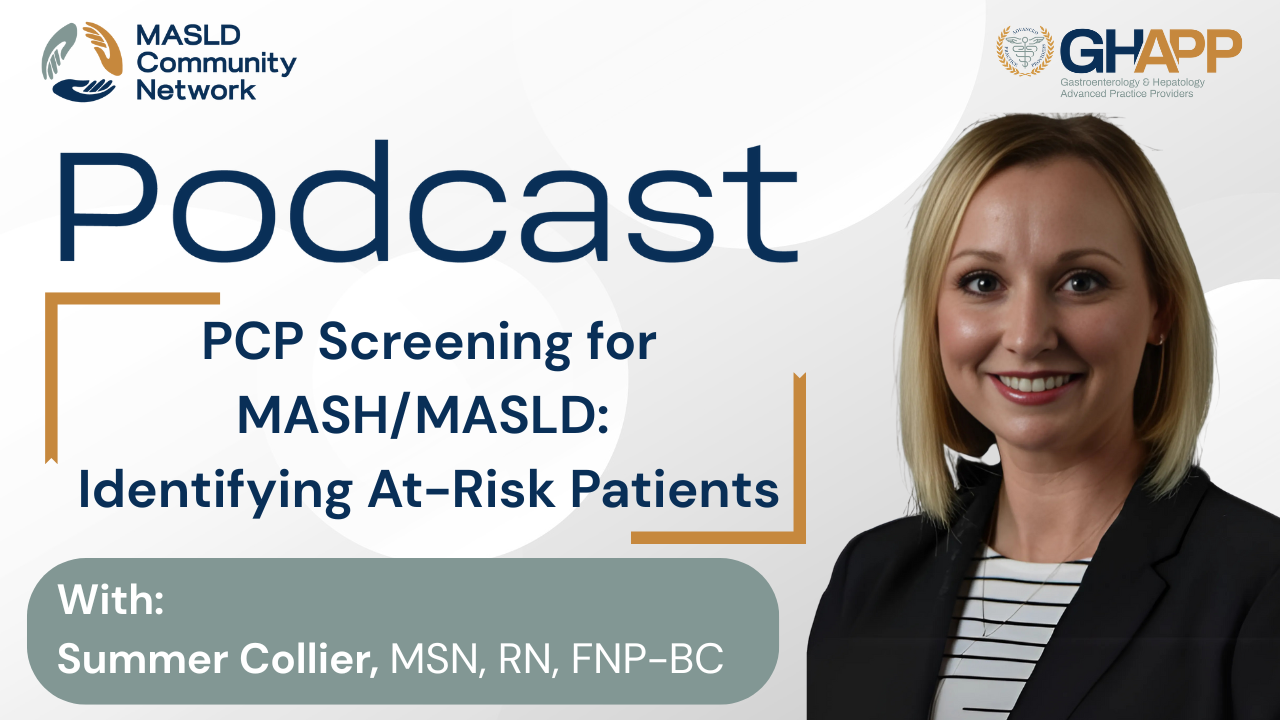
Podcast: PCP Screening for MASH/MASLD: Identifying At-Risk Patients

In this essential podcast episode from the GHAPP MASLD/MASH Community Network, Summer Collier, NP at UC San Diego Health, dives into the critical role that primary care providers and advanced practice providers play in recognizing and managing MASLD (Metabolic dysfunction-associated steatotic liver disease) and its progressive form, MASH (Metabolic-associated steatohepatitis). With MASLD affecting a growing number of patients—many undiagnosed—Summer walks through practical strategies for early identification, starting with high-risk individuals such as those with type 2 diabetes, obesity, or metabolic syndrome. She highlights the use of the FIB-4 index as a quick, validated, and guideline-recommended first-line screening tool, and explains how to interpret FIB-4 results to stratify risk and determine next steps, including ELF testing, FibroScan®, or referral to GI/hepatology. Summer also offers actionable workflow tips to integrate liver screening into routine primary care, like embedding FIB-4 calculators in EMRs or incorporating assessments into annual diabetes visits. This episode is a must-listen for clinicians seeking to prevent liver fibrosis progression and liver cancer through early, proactive care.
Watch Now

Differentiating Between F3 and F4

In this comprehensive discussion, HoChong Gilles, a nurse practitioner with 25 years of hepatology experience at the Richmond VA Medical Center, explores the critical importance of accurately distinguishing between F3 (advanced fibrosis) and F4 (cirrhosis) in patients with MASH (metabolic-associated steatohepatitis). While both stages carry increased risks of liver-specific and overall mortality, Gilles explains that F3 may still be reversible with lifestyle changes or pharmacotherapy, whereas F4 signals irreversible liver damage with heightened risk of complications like portal hypertension, hepatic encephalopathy, and liver cancer. Viewers will gain a deeper understanding of how non-invasive tests—like FIB-4, ELF, FibroScan, and MRE—perform in identifying fibrosis stage, including their limitations and overlaps. Gilles also outlines when to consider liver biopsy, especially in cases with discordant test results, atypical features, or clinical uncertainty. This video emphasizes how staging accuracy informs eligibility for therapies, surveillance strategies like HCC screening, and overall prognosis. Learn how to approach this nuanced distinction in clinical practice and why F3 vs. F4 isn't just semantics—it's a turning point in patient care.
Watch Now

Addressing Health Disparities: Equity Considerations in MASH/MASLD Care

In this episode, Patrick Horne, NP at the University of Florida (UF Health), explores the impact of health disparities and socioeconomic inequality on the diagnosis and management of MASH (metabolic-associated steatohepatitis) and MASLD (metabolic dysfunction-associated steatotic liver disease). With a focus on rural and underserved populations, Patrick discusses how limited access to quality healthcare, healthy food, exercise options, and non-invasive testing (NITs) like FibroScan or MRI elastography can delay diagnosis and worsen outcomes. He shares practical, empathetic strategies for individualizing care, such as using accessible tools like FIB-4 or APRI, promoting low-cost physical activity like walking or swimming, and providing culturally sensitive nutrition advice tailored to financial and geographic realities. Patrick emphasizes the provider’s role as a patient advocate and coach, helping patients navigate barriers and create sustainable lifestyle modifications. This episode offers key insights for clinicians working to close gaps in care and promote equity in liver disease management.
Watch Now

Pharmacotherapy Review

Join Christina Hanson, FNP-C, from South Denver Gastroenterology, as she provides an in-depth overview of the current pharmacologic treatment landscape for Metabolic Dysfunction-Associated Steatotic Liver Disease (MASLD) and Metabolic Dysfunction-Associated Steatohepatitis (MASH). This expert-led session explores the three cornerstones of MASH management—lifestyle and weight loss interventions, cardiovascular risk reduction, and liver-directed therapy—while highlighting the evolving role of GLP-1 receptor agonists and the recent FDA approval of resmetirom, the first medication indicated for adults with MASH and moderate to advanced fibrosis. Christina also discusses clinical trial data from MAESTRO-NASH, reviews historical agents like vitamin E and pioglitazone, and offers practical guidance on patient selection, safety considerations, and monitoring strategies. Whether you’re a GI provider, hepatology specialist, or primary care clinician managing fatty liver disease, this video provides valuable insights into how emerging therapies are shaping the future of MASH treatment.
Watch Now

Liver Model Overview

Join Alison Moe, PA-C with United Digestive, as she walks through a hands-on demonstration using a life-sized liver model to help patients better understand fibrosis and liver disease progression. In this engaging and practical overview, Allison explains how different stages of liver fibrosis—from normal liver to cirrhosis and hepatocellular carcinoma—can be felt and visualized using a segmented anatomical model. She shares how this tool enhances patient education during discussions about non-invasive liver testing, such as FibroScan, CAP scores, FIB-4, ELF testing, and more. Designed to support visual learners and improve comprehension of disease state, this video is a valuable resource for clinicians and patients navigating the complexities of metabolic-associated fatty liver disease (MASLD) and its progression to MASH. Learn how tactile and visual teaching aids can bridge the gap between diagnostics and patient understanding in hepatology care.
Watch Now
Related Content
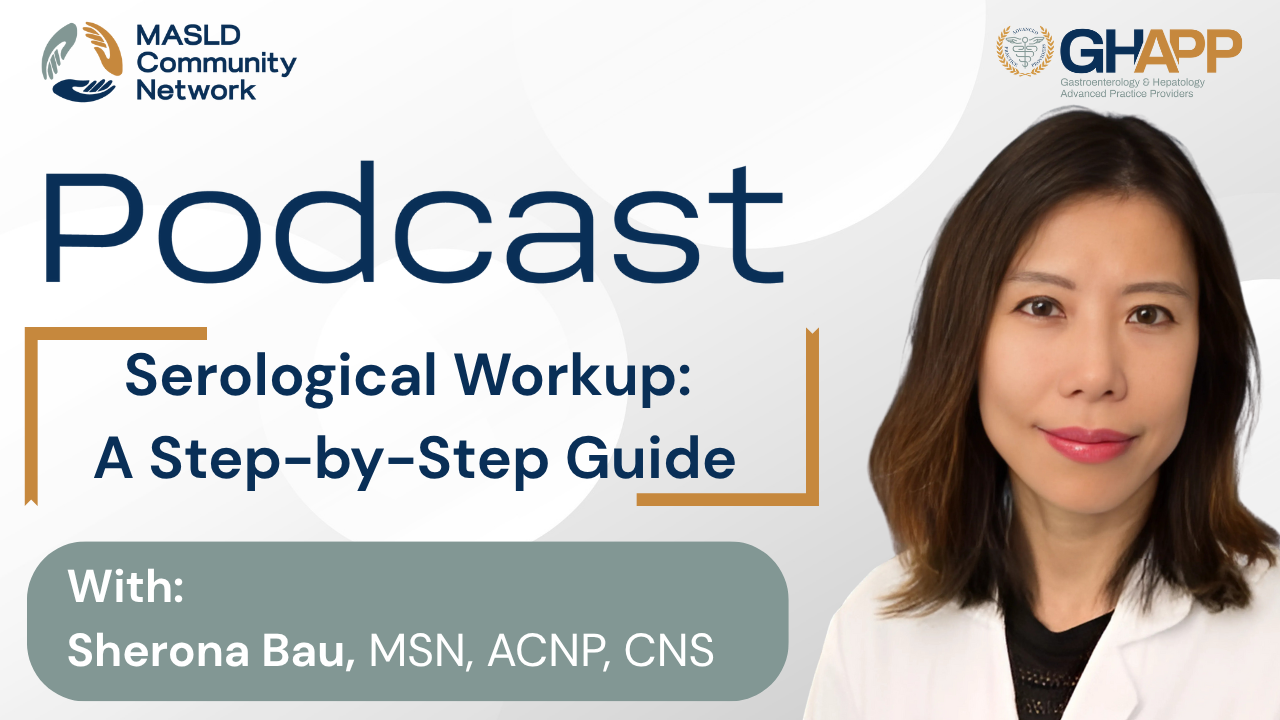
Serological Workup: A Step-by-Step Guide

In this comprehensive video, Sherona Bau, NP from UCLA, breaks down the essential hepatology workup for patients with MASLD (formerly NAFLD) and MASH, offering guidance for both primary care providers and GI/hepatology specialists. Drawing from her extensive clinical experience, she outlines a systematic approach to evaluating abnormal liver ultrasound findings—starting with critical labs to rule out chronic liver conditions like hepatitis B, hepatitis C, autoimmune hepatitis, PBC, and hereditary hemochromatosis. Sherona discusses the importance of ordering ANA, AMA, ferritin, serologies, and even specialized labs like the phosphatidylethanol (PEth) test to uncover alcohol-related liver disease that may be overlooked. She emphasizes the need to screen for cardiometabolic risk factors including type 2 diabetes and dyslipidemia and highlights non-invasive tests such as FibroScan and FIB-4 to help identify patients at risk of advanced fibrosis who may benefit from specialist referral. Most importantly, Sherona addresses the fears many patients face around liver disease progression and life expectancy, encouraging early intervention and coordinated care to improve long-term outcomes. This video is a must-watch for any clinician managing steatotic liver disease.
Watch Now
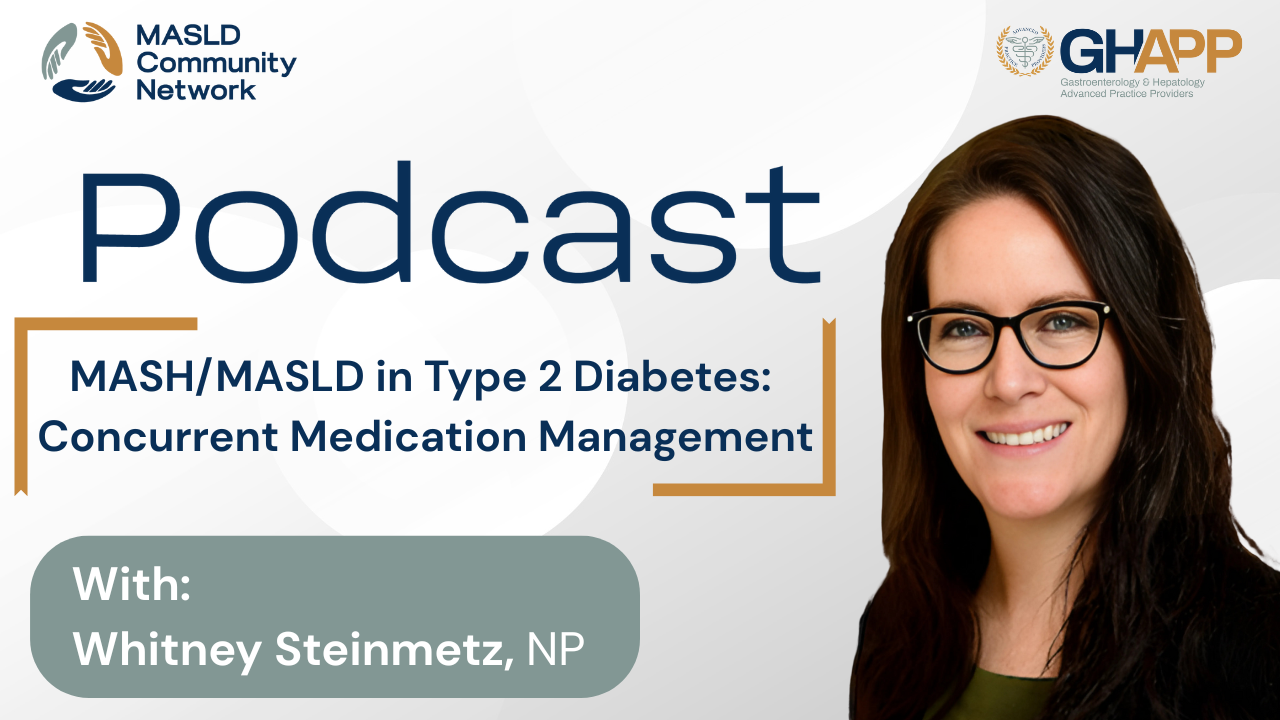
MASH/MASLD in Type 2 Diabetes: Concurrent Medication Management

In this informative episode, Whitney Steinmetz, NP from Presbyterian Medical Group in Albuquerque, NM, explores how to optimize medication strategies for patients with type 2 diabetes who are also living with MASLD and MASH. She discusses why individuals with type 2 diabetes are at significantly higher risk for developing advanced liver fibrosis—highlighting the overlapping metabolic, inflammatory, and insulin-resistant pathways that accelerate liver damage. Whitney breaks down how commonly prescribed diabetes medications—like GLP-1 receptor agonists, SGLT2 inhibitors, TZDs, and dual/triple incretins—impact liver fat, inflammation, and fibrosis progression. She offers practical guidance on selecting therapies that balance glycemic control with hepatic benefits while minimizing polypharmacy. Learn which medications may offer dual cardiometabolic and hepatic advantages, and which should be avoided or used with caution in patients with cirrhosis or advanced fibrosis. Tune in for real-world insights into how advanced practice providers can take ownership of MASH management in diabetes care.
Watch Now
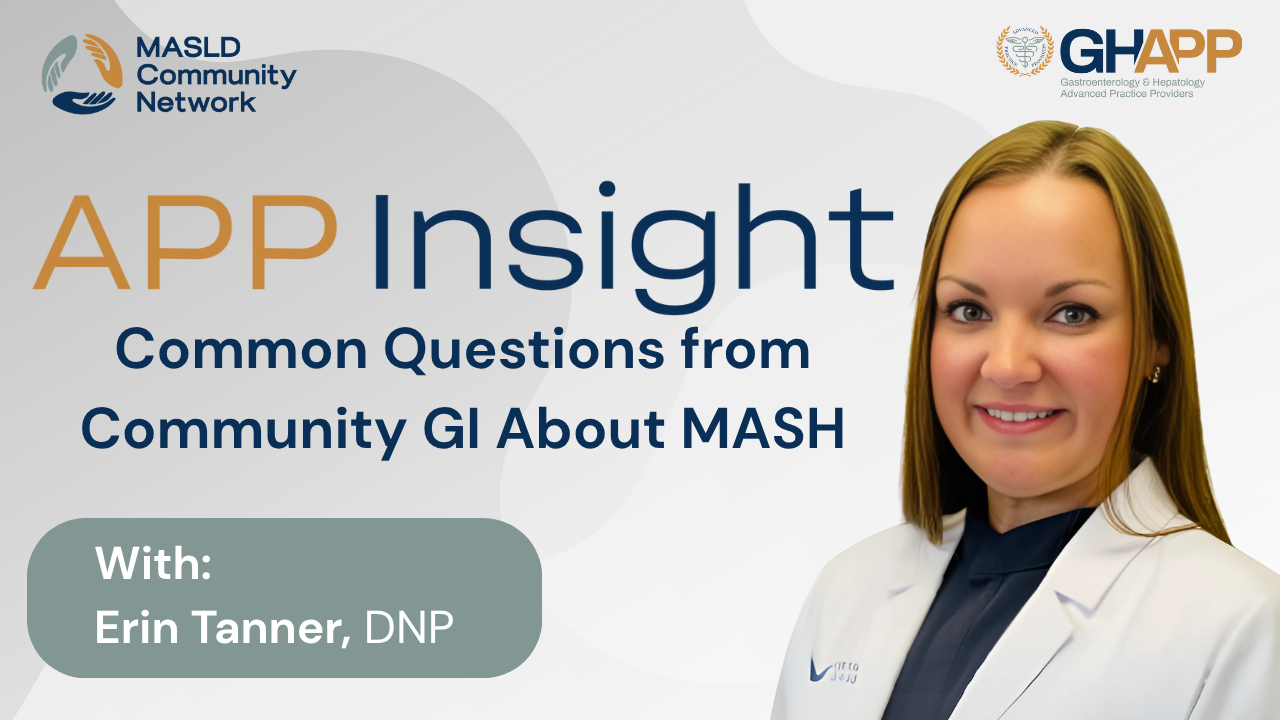
Common Questions from Community GI About MASH

In this practical and timely video, Erin Tanner, NP at Gastro Health in Birmingham, Alabama, shares expert insights on how community gastroenterology providers should approach incidental findings of fatty liver (MASLD/MASH) on abdominal imaging. With over 14 years of experience in GI and hepatology, Erin emphasizes that fatty liver can no longer be ignored, even when discovered during workups for unrelated GI symptoms like reflux or diarrhea. She walks through the step-by-step use of the FIB-4 index to risk-stratify patients and explains when to follow up with further non-invasive testing such as FibroScan® or ultrasound elastography. For patients with F3 fibrosis, Erin outlines next steps including lifestyle interventions, the use of Resmetirom, and the promise of GLP-1 therapies for future treatment. This is a must-watch for GI clinicians aiming to improve outcomes by proactively managing fatty liver disease in everyday practice.
Watch Now
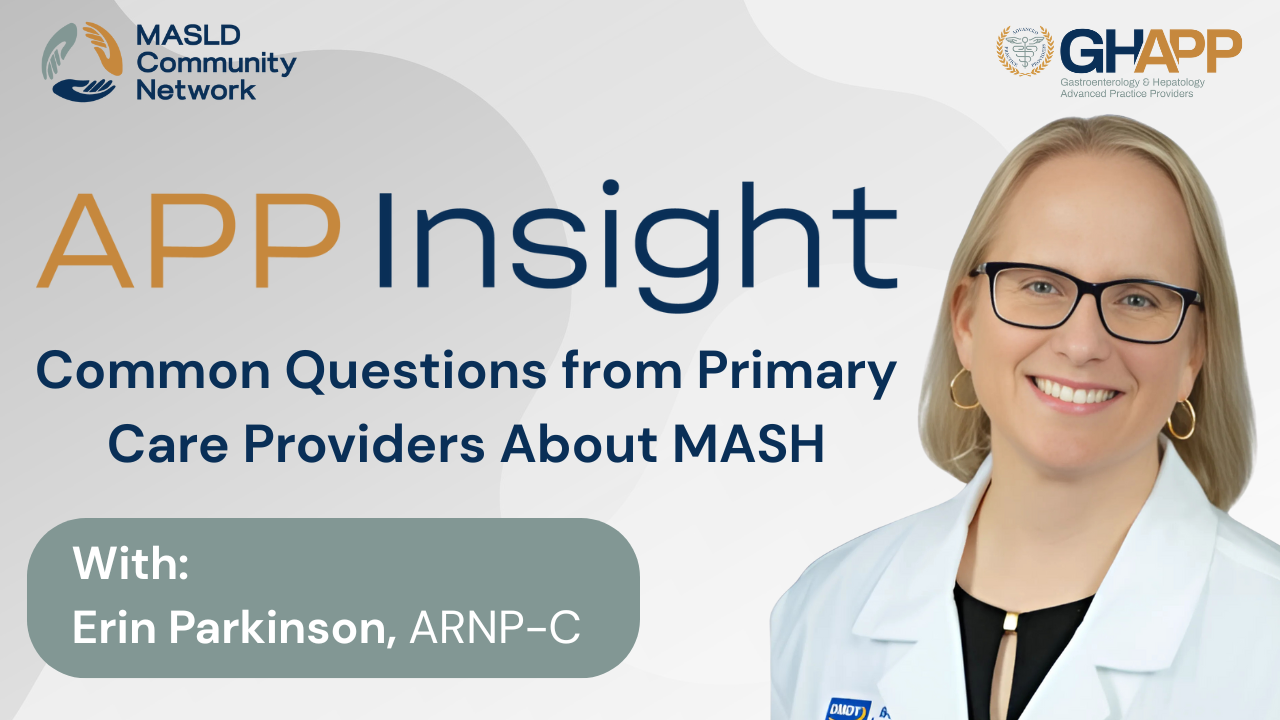
Common Questions from Primary Care Providers About MASH

In this educational video, Erin Parkinson, ARNP-C at the Transplant Institute at Tampa General Medical Group, addresses two of the most frequently asked questions from primary care providers about MASLD (Metabolic dysfunction-associated steatotic liver disease) and MASH (Metabolic-associated steatohepatitis). First, she explains when it’s appropriate to refer a patient to GI or hepatology, emphasizing the use of FIB-4 for risk stratification and recommending referral when scores are indeterminate or high, especially if a FibroScan® result shows ≥8 kPa. Erin also discusses lifestyle interventions, reinforcing the importance of weight loss and dietary modification, with strong endorsement of the Mediterranean diet—a recommendation supported by major liver societies. She also notes that intermittent fasting may be a helpful adjunct for patients seeking to improve liver health through sustainable weight reduction. This video provides practical tools for frontline providers to improve early detection and management of fatty liver disease.
Watch Now

MASH Bootcamp Q&A

In this interactive Q&A session, a panel of liver disease experts discusses key challenges in diagnosing and treating metabolic dysfunction-associated steatohepatitis (MASH) using non-invasive testing and the latest therapeutic advancements. The panel explores the role of FibroScan, ELF scores, and cardiometabolic risk factors in diagnosing fibrosis, especially in patients with limited access to MRI or VCTE-based assessments. They also discuss how serologic testing can be a viable alternative in resource-limited settings and when a liver biopsy may not be necessary for diagnosis. The discussion highlights the FDA approval criteria for Resmetirom, its limitations in F4 patients, and practical strategies for determining treatment eligibility. The experts address real-world challenges, including diagnosing MASH in rural areas, evaluating confounding factors in fibrosis assessment, and ensuring comprehensive liver disease workups to rule out autoimmune conditions.
Watch Now
Highlighted Events

GHAPP Eighth Annual Conference

About the 2025 GHAPP Conference The GHAPP conference is the only conference specifically designed by advanced practice providers (APPs) for the pur..

MASLD vs MetALD - Virtual

Join Summer Collier, FNP, on September 24, 2025, for a live GHAPP Zoom session focused on MASLD vs MetALD. ..

Pacific Northwest GI & Liver Update

The 2025 Pacific Northwest GI and Liver Conference will deliver focused educational updates highlighting clinically relevant advances in the managemen..




